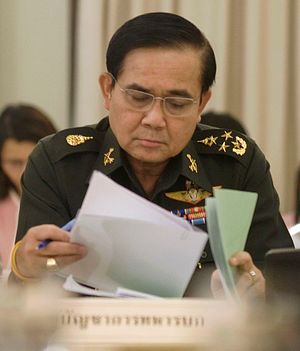On January 23, Thailand’s King Maha Vajiralongkorn issued a royal decree to call for a general election and, shortly after, the Election Commission announced that it will be held on March 24. The date announced comes after a string of postponements — five at the last count — of an election that will usher in the first civilian government since the 2014 coup.
Prime Minister Prayut Chan-o-cha, who heads the National Council for Peace and Order (NCPO), was announced as the prime ministerial candidate of the Palang Pracharat Party (PPRP) on February 7. The PPRP is a pro-junta party that was formed by four cabinet ministers of the current military regime, and is seen by some as a proxy for the NCPO.
A surprise announcement by the Thai Raksa Chart party on the same day stated that Princess Ubolratana Rajakanya, elder sister of King Vajiralongkorn, was their prime ministerial candidate. The unprecedented move represented the alignment of a senior member of the endeared royal family with the exiled Shinawatras, who still wield significant influence in the Pheu Thai Party and its offshoots, including the Thai Raksa Chart party. Siblings Thaksin and Yingluck Shinawatra were both former prime ministers of the country, and were unceremoniously ousted by the military in 2006 and 2014 respectively. However, following a televised palace statement condemning her political ambitions as unconstitutional and inappropriate, the Thai Raksa Chart party declared on February 8 that they would withdraw their support for Princess Ubolratana.
Despite the efforts by anti-junta parties to draft symbolic and high-profile figures as competitors, the military-drafted 2017 constitution ensures that Prayut is still in pole position to emerge victorious. Changes introduced in the 2017 constitution have paved two pathways for the Prayut’s prime ministerial nomination. Members of the lower house, known as the House of Representatives, first vote for the prime ministerial candidates of parties with at least 25 seats in the house. Should the vote be inconclusive, a second simple majority vote is held across both houses to select an individual as prime minister. This individual may be unelected; Prayut himself cannot constitutionally run in the upcoming elections. Prayut enjoys a significant numerical advantage in such a vote, as all 250 members of the upper house are appointed by the NCPO.
The 2017 constitution also mandates that the 2014 interim charter be in effect until the new civilian cabinet convenes after the polls. During this time, the current military regime retains powerful tools that can be used to garner support for pro-junta parties and hamper the opposition. Article 44 of the interim constitution grants the NCPO the ability to make sweeping reforms across all sectors; the NCPO can replace key government officials at will. In September 2018, in an effort to garner support ahead of the elections, Prayut replaced the mayor of Pattaya with the junta-aligned leader of the Phalang Chon Party.
Article 44 also grants the security forces the power to arbitrarily detain individuals. Opposition members and critics of the junta have been summoned for “attitude adjustment” sessions by the military government, and individuals can be held for up to seven days without charge or access to lawyers. The NCPO can also thus effectively reduce the ranks of opposition parties by arbitrary detention, or by enforcing spurious charges brought against them; this includes the use of the Computer Crime Act and even sedition charges.
Additionally, other changes introduced by the 2017 constitution are designed to handicap anti-junta parties, specifically Thailand’s biggest political party, the Pheu Thai Party. The party has won every election since 2001 but the modified proportional representation method introduced is aimed at reducing the number of seats held by larger parties. The NCPO plans to mitigate the risk of another landslide victory by Pheu Thai and, at the same time, encourage the proliferation of medium-sized pro-junta parties. This change has also created a conducive environment for the formation of coalitions; parties have recognized the implications of this change, and have been actively courting an alliance with the Democrat Party, which is seen as a potential “kingmaker” party.
In the meantime, pro-junta parties have been actively recruiting members. The two major opposition parties, the Democrat Party and the Pheu Thai party, have been weakened by defections to the PPRP. Candidates from both parties have been joining pro-junta parties due to the perceived and tangible long-term benefits. The military will indubitably wield significant influence over any future administrations, regardless of the results of the polls in March. For instance, governments must abide by the 20-year national strategy that was laid out by the NCPO in the new constitution. Moreover, the upper house, comprised of NCPO-appointed senators, also has the power to block legislation, providing a de facto veto power to any proposals that may diminish the influence of the military.
As March approaches, the fluid nature of affairs in Thai-style democracy would mean that further political maneuvering and even another delay of the election, cannot be ruled out; the constitution allows for the vote to be held by May 9.
Sebastian Liu, based in Singapore, is a Global Threat Analyst for Asia Pacific with Healix International Risk Management Services, a global risk management group based in the United Kingdom.































